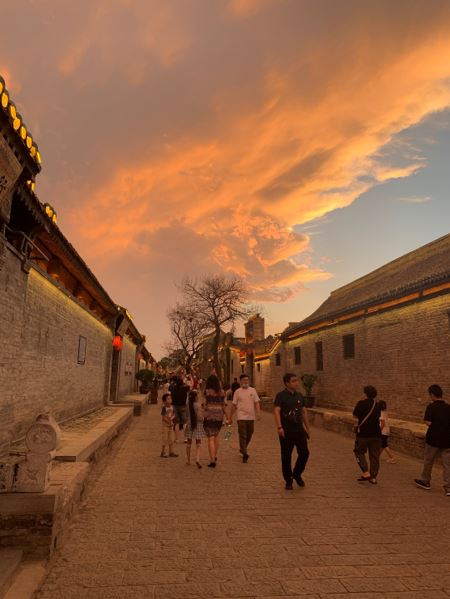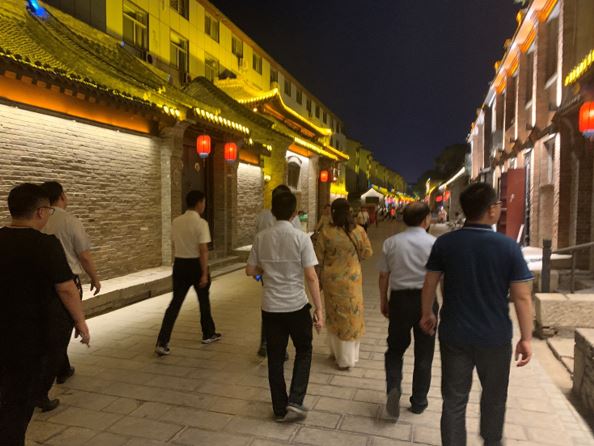I had always known that accessing government officials in China could be challenging. In my fieldwork, however, there emerged more unexpected challenges when I was interviewing them. This time, I have realised that letting them not know about my research instead of keeping it transparent may be safer for them and a more ethical course of action. And maintaining their anonymity needs to include keeping our conversations secret from their superiors, writes Ran Wei.
_______________________________________________
I started my PhD fieldwork in a small Chinese city in 2021. Since my PhD research investigates a local government-led heritage regeneration project, a large part of my fieldwork involved talking to the local government officials regarding their rationales for conducting the heritage project, their decision-making and implementation processes, and their visions for the heritage area. This was not my first time engaging with local government officials in China. My previous experience doing similar research in other Chinese cities taught me how important personal connections were when accessing the Chinese government. This time, through a family friend, I surprisingly easily got access to local officials at different levels at the very beginning of my fieldwork.
However, other dilemmas emerged during my conversations with them, which is something that I believe is crucial to reflect upon. The first dilemma was my concern about whether the local officials fully comprehended what my research was about or not. The second dilemma was my concern about whether the local officials were pressured to talk to me because my gatekeeper was their superior, a higher-level official in the local government. In short, the dilemmas were centred around research transparency and coercion.
Am I clear enough about my research?
At the beginning of my conversations with all my interviewees, in order to guarantee research transparency (Moravcsik, 2019), I would explain what I was doing to them with plain language and gain their consent to be interviewed. However, the responses of the local government officials made me wonder if they understood what I said to them.
After I introduced my research to the local officials, they usually gave no comments on it. During our conversations, they would then constantly encourage me to dig deeper into the history of the heritage areas in the city. It seemed that the local officials had their own presumptions of my research content and did not pay much attention to what I said. To them, my research probably sounded more like an urban planning history topic that examined the historical development of the heritage areas. In contrast, they ignored the heritage politics essence of my research. At the same time, they hoped that I could help promote the heritage areas and their conservation projects widely, even overseas, to attract more international tourists to the city.
In my fieldwork, I could not tell whether the local officials’ responses were intentional or unintentional. And because of their ambiguous responses, I was worried about whether my research was transparent enough to them and whether they blindly participated in something that they did not understand. My strategy to solve this issue in the field was to explain my research to them over and over again. But at some point, I had to stop and continue with my interview questions. I had to assume that with multiple times of explanations, they should have a better sense of what my research was truly about.
When I was writing the methodology chapter of my thesis after I returned from my fieldwork, I encountered one paper by a scholar doing research in China who was trapped in a similar situation (Yeh, 2006). In this scholar’s fieldwork, her gatekeeper did not disclose her nationality and the full details of her research to other local government officials. These local officials then seemed to “blindly” participate in a study that they did not know much about. The scholar later realised that it was, in fact, the gatekeeper and the local officials’ self-protection mechanism. Because the research topic was sensitive, the local officials may get into trouble if the higher-level governments found out about their participation in this research. However, there is a Chinese idiom, “People who don’t know are not guilty” (buzhizhe wuzui, 不知者无罪). It means that if the local officials did not fully know about the research and just answered some random questions, they would not be responsible for what they said and the associated potential political risks (ibid.). As Yeh (ibid., pp. 103-104) explained: “To him [the gatekeeper], the ethical course of action was to give the people with whom I spoke a way out. They did not want to be responsible for the knowledge of who I was, and if I forced them to be, they would either have to refuse to talk to me altogether, or they would have to bear responsibility that they did not want”.
In retrospect, I realised that the local officials I interviewed may have taken a similar strategy. They perhaps “pretended” that they understood my research in the wrong way so that they could talk to me more freely. Arguably, this raises the ethical question of whether my research was transparent enough to my participants and whether I fully informed them. However, I do agree with Yeh (2006, p. 104) that “giving my interviewees room to manoeuvre by pleading ignorance was a more, rather than less, ethical choice”. This is perhaps a safer way for them to avoid future trouble with higher-level governments regarding their participation in my research.

Being a cooperative subordinate?
As I mentioned, personal connections (guanxi), whether they are formal or informal, are important to access the Chinese government (Liang & Lu, 2006). In my fieldwork, I was lucky enough to have a family friend who helped me contact a high-level official in the local government. In this local official’s office, he simply made a few phone calls to his subordinates in different offices or departments and gave me the phone numbers of these subordinates. When I later met with these subordinates, they were all very gentle and friendly. No matter how sensitive or difficult my interview questions were, they answered them with no hesitation. When I asked for certain government reports and planning documents, they also did not hesitate to copy and paste the entire folder from their computers to my USB drive.
This made me wonder if this is a form of coercion (McDermott, 2013). That is, the reason why the lower-level officials were candid to me was that they were under pressure from my gatekeeper, the high-level official. Personally, they probably did not want to participate in my research. Yet if they did not “cooperate”, they may piss off their superiors and consequently encounter barriers in their future job and could not get promotions in their career (Yan, 1995). It may be this worry or even fear that urged them to answer my interview questions and provide me with the materials that I asked for.
In my field, at the beginning of my interviews, I always made it clear to the local officials that they did not need to care about their superiors but only decided on their own whether they wanted to participate in my research. And if they did voluntarily participate, I would ensure their anonymity. More importantly, I never disclosed any of my interviews with the lower-level officials to my gatekeeper, the high-level official who put me in touch with the lower-level officials. Theoretically, the superior would not know whether his subordinates were “cooperative” and “obedient” enough or not, at least not from me. To be honest, I could not tell if coercion happened in my fieldwork or not. In my capacity, I could only try my best to guarantee the anonymity of my interviewees. This anonymity not only refers to not disclosing their personal information in my thesis but, perhaps more importantly, to not disclosing their “performance” in front of me to their superior.

Concluding thoughts
Qualitative researchers conducting fieldwork in different contexts with different participants usually face different difficulties and dilemmas. In my PhD fieldwork, my interaction with the Chinese local government officials represents a special type of encounter between the researcher(s) and the researched. This interaction is particularly complicated by the political system of the Party-state. Within this system, political power resides at the higher level of the Chinese government (Lieberthal & Oksenberg, 1988), while lower-level government officials tend to perform in line with the preferences of their superiors (Göbel & Heberer, 2017). This hierarchical power structure within the Chinese bureaucracy heavily influences how I can gain access to the government through personal connections and how the local officials responded to my research overall, as well as to my interview questions and other requests. As researchers with little or no political power within this system, we are constantly caught in the predicament of being responsible researchers, such as dealing with research transparency and coercion. There may never to the best answer to solve these issues. What I have learned from my PhD fieldwork is that, first, hiding information about the research is not necessarily unethical. Second, if coercion is inevitable or indistinguishable, anonymity in the sense of protecting lower-level officials from their superiors’ judgement is helpful.
References
Göbel, C., & Heberer, T. (2017). The policy innovation imperative: Changing techniques for governing China’s local governors. In V. Shue & P. M. Thornton (Eds.), To govern China: Evolving practices of power (pp. 283-308). Cambridge: Cambridge University Press.
Liang, B., & Lu, H. (2006). Conducting fieldwork in China: Observations on collecting primary data regarding crime, law, and the criminal justice system. Journal of Contemporary Criminal Justice, 22(2), 157-172.
Lieberthal, K., & Oksenberg, M. (1988). Policy making in China: Leaders, structures, and processes. Princeton: Princeton University Press.
McDermott, B. E. (2013). Coercion in research: Are prisoners the only vulnerable population? Journal of the American Academy of Psychiatry and the Law Online, 41(1), 8-13.
Moravcsik, A, (2019). Transparency in research. SAGE Research Methods Foundations. London: SAGE Publications Ltd. Available at: https://www.princeton.edu/~amoravcs/library/TransparencyinQualitativeResearch.pdf (accessed 5 May 2023).
Yan, J. (1995). The nature of Chinese authoritarianism. In C. L. Hamrin & S. Zhao (Eds.), Decision-making in Deng’s China: Perspectives from insiders (pp. 3-14). New York: M. E. Sharpe, Inc.
Yeh, E. T. (2006). ‘An open Lhasa welcomes you’: Disciplining the researcher in Tibet. In M. Heimer & S. Thøgersen (Eds.), Doing fieldwork in China (pp. 96-109). Honolulu: University of Hawai‘i Press.
______________________________________________
*Banner photo by and copyright of the Author.
*The views expressed in the blog are those of the author alone. They do not reflect the position of the Saw Swee Hock Southeast Asia Centre, nor that of the London School of Economics and Political Science.




